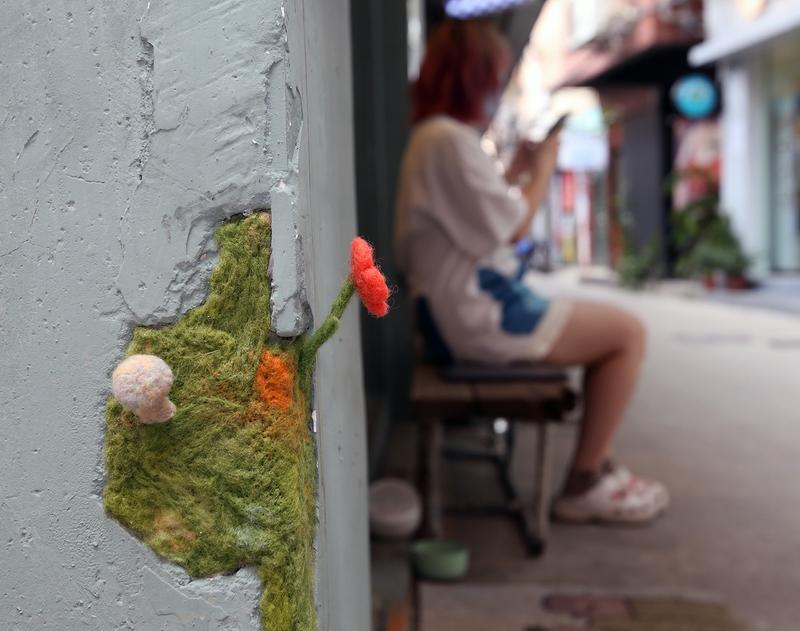May 19, 2022
GUANGZHOU – Strolling around Nanting village in Guangzhou, Guangdong province, one can see bright flowers “blooming” on street corners and walls.
A closer look will reveal these flowers are actually made of felt and have been “planted” on a small patch of artificial grass. Their chief gardener is Luo Shengtian, a fifth-year student at the Experimental Studio of the School of Sculpture and Public Arts, part of the Guangzhou Academy of Fine Arts in the nearby Guangzhou Higher Education Mega Center.
The yellows, reds, purples and pinks of his tulips, corn poppies, chrysanthemums and calla lilies are designed to smooth over broken corners and walls. “Some streets in the village are narrow, and I’m sometimes bruised by broken corners when I’m riding my bicycle. They can hurt children, too.”
Luo first began his repairs using felt colored to resemble the building materials they were meant to patch. In addition to the challenge of getting the color to blend properly, however, he soon grew bored.
An older schoolmate told him to think of something that would interest him more, and he immediately thought of flowers. Already working on a graduation project using felt, Luo was advised by his supervisor to focus first on community relationships.

Two felt flowers are installed in a broken wall in the village. (PHOTO PROVIDED TO CHINA DAILY)
Luo makes felt flowers at home using a needle, and stiffens them by inserting a wire into their stalks. On-site, he sticks clay to the broken area, puts the flower in the clay and then adds green felt to make grass and help secure the flower in place, “rooting” it, as it were.
He installed his first flower at the base of a memorial archway on April 5. Four days later, he saw that a section of the front wall of a dessert shop was broken, so he and a friend fixed it using another of his creations. He was a little concerned as the shop was private property, and he worried the owner might not like his intervention.
In fact, the owner was pleased and surprised. He looked Luo up on WeChat and left him a message. “My shabby wall now has such a beautiful and heartwarming flower. I really like it. I’m touched. A gesture like this cannot be rewarded with money, so I’m treating you to free sweet soup for a month. It’s my small token.”
Luo politely declined the offer.
A young boy in the village also liked the flower, so much so that he took it for himself, and its replacement, too. The shop’s owner caught him in the act and asked him to become the flower’s guardian. Since then, it has remained in place.
Luo has planted 18 flowers around the village. He said they can withstand a certain amount of sun and rain, and he replaces any that go missing. He added that he feels the flowers have helped bring life to old buildings and serve as warm touches for villagers.

Luo displays one of his felt flowers. (PHOTO PROVIDED TO CHINA DAILY)
After a schoolmate posted a video of his little flowers online, they became a sensation and have been hailed as “soft patches for the city” and as “letters from Spring”. Luo began to receive requests from volunteers and decided to expand his activities. He set up a WeChat group named “little flower chivalry”, which now has over 200 members from other Chinese and foreign cities. They include schoolmates, journalists, restaurant operators and students in countries including New Zealand, the United States, the United Kingdom and Italy. Luo shares his flower-making techniques with them.
Lin Lizhang, Luo’s former landlady, has made six flowers for Nanting. “I’m happy to be involved in making these repairs with young people. It’s a creative and beautiful thing, and people young and old like it,” said the 49-year-old, who used to work in garment manufacturing.
Wang Qiyao, a schoolmate who works part-time at the dessert shop, has made flower and mushroom patches with her boss. “After the first flower, my boss said our shop was trending online. Sometimes, I hear children shouting ‘Wow, this is the little flower we saw on Douyin (a short video platform)’! The flowers make our shop more inviting and more personal,” she said.
Through the group, the flower patches have spread to other universities in the Guangzhou Higher Education Mega Center, as well as other cities.
For those unable to find felt at the moment, Luo suggests using crochet needles and thread instead.
He plans to create a national map to show where other flowers have been installed before he graduates in June. The project has helped him learn more about himself. “I was rather indoorsy, a bit socially phobic and floppy. Now, I go outdoors often and share things with others,” he said. “I think I’m pretty good. I take a broader view of life.”


